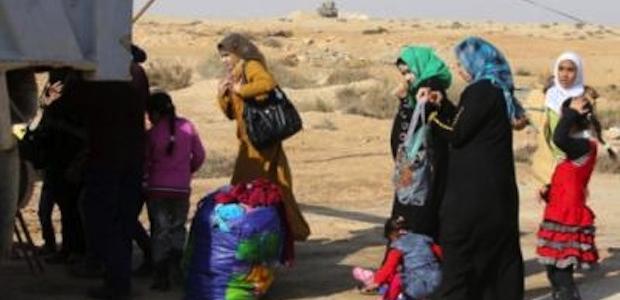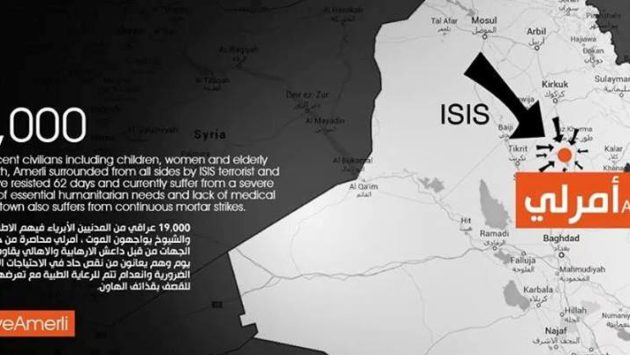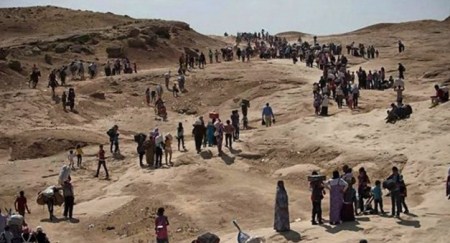‘We Don’t Trust Anyone’: Iraq’s Displaced Minorities Not Ready To Return Home
“We really want to go back to our village but there are no guarantees that what happened before will not happen again,” says Ismael Rasho, a Yazidi man in his 50s currently in a displaced persons camp in Dohuk; he used to live in Zorava, a village in Sinjar. “We cannot live alongside the people who betrayed us and who took our people captive.”
“Many people in our village were killed,” says a woman who wished to be known as Umm Durman; she used to live in the village of Hardan. “And although it is now free of the extremists I couldn’t take my children back there. The area isn’t safe yet; there are still car bombs and other hidden explosives there.”
These two displaced Iraqis are not the only ones. Some estimates suggest that almost a quarter of a million people fled the Sinjar area when extremists from the group known as the Islamic State took control of the area last August; they killed many male members of the ethno-religious group known as the Yazidis who dominate in the area and kidnapped and enslaved their women. Many of the villages and towns in the Sinjar district have now been liberated from the extremists but hardly any of the locals have returned.
“Not many people have returned back to the areas closer to the fronts, like Sanouni and Rabia,” says Shirzad Bermousa, a civil society activist. “There were 22,000 families living in the Sanouni area and now there are only about 200. Although a lot of people from the Zamar area have gone back – but that is about 100 kilometres away from the front.”
“On the security level, the Iraqi Kurdish military are now controlling the area, together with the Yazidi militias and the Syrian-Kurdish forces there,” confirms Mayasar Haji, the mayor of the Sinjar district. “There is no real danger posed by the extremists.”
However he was quick to add that there were no municipal services available in the area. “There is no electricity and no water supply,” Haji told NIQASH. “But we have asked the Mosul council to start supplying these and other things like health services. We’ve also asked the municipal services responsible for street cleaning to begin work here and we’re working on other services. It’s slow work though,” he admits, “because the area remains fairly close to the front line and the IS group still control parts of Sinjar.”
According to military commander Ezzedine Saado, who heads the Iraqi Kurdish military based in the Rabia and Sanouni areas of Sinjar, security conditions are stable. “There has been some trouble between the Yazidis and the Arab tribes in these areas but we intervened to resolve them. Having said this, it is still not completely safe here because of the risks from improvised explosive devices, car bombs and other detritus that the extremists left behind.”
“My town is a ghost town,” complains Mustafa Seydou who is originally from Sanouni. “There’s no water or electricity or other services and the city is almost completely empty.”
He added, somewhat bitterly, that there had also been murders committed for revenge with the victims being some of those who had returned home.
“There’s just no reason to return,” says another woman who wanted to be known as Umm Nawfal and who is originally from Tel Skuf in the Tel Kaif area. “They stole everything we had in our houses. We don’t trust anybody anymore. They have targeted everything that is sacred to us, our holy places, our civilisation. They left us with nothing.”
“If peace and security is not restored, and services provided, the displaced cannot return,” agrees researcher and journalist Khader Domli, who specializes in conflict resolution at Dohuk University. “And there is another thing that local authorities should take into consideration. They need to gain people’s confidence and try to find a way to address the fact that local minorities – such as the Christians, the Yazidis and the Shabak – do not believe that the state cares for them. The Iraqi government should pass laws and work harder on existing ones that relate to minority rights.”
Naseem Sadiq, another local journalist who has reported often on minority rights, believes that local clerics should also clarify their position on Iraq’s minorities. Sadiq points out that the IS group justified their persecution of Iraq’s minorities using religion, now the victims need reassurance that the rest of the country doesn’t see it the same way.
“People are not just afraid because of security concerns,” Sadiq says. “They’re also worried because, after being targeted for their religious beliefs, they worry about the way others think of them.”





